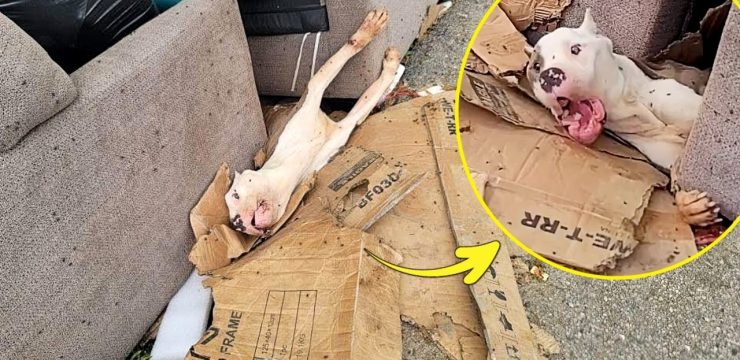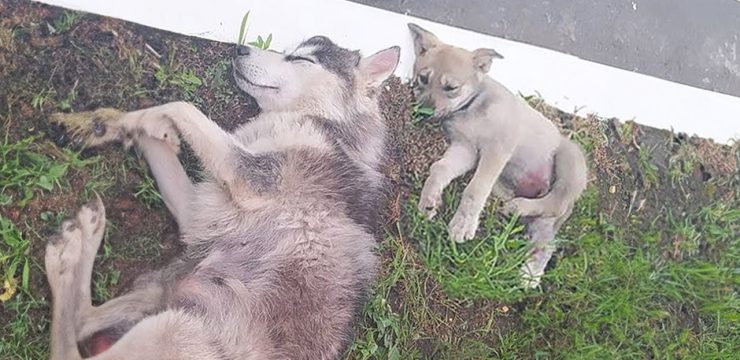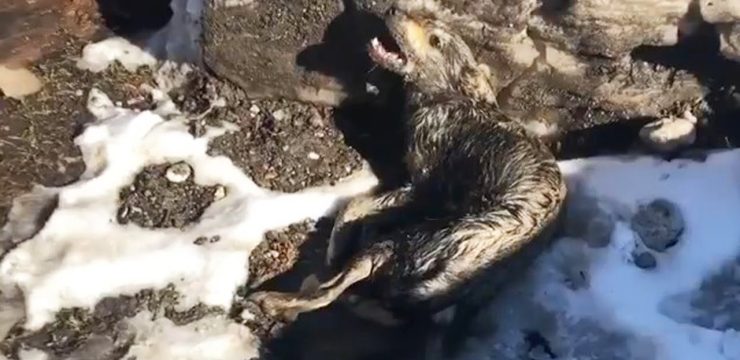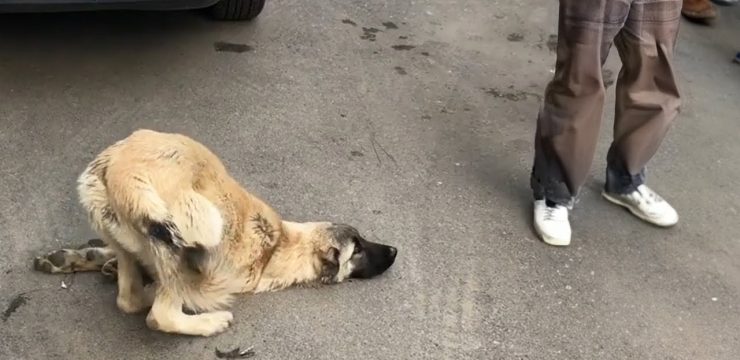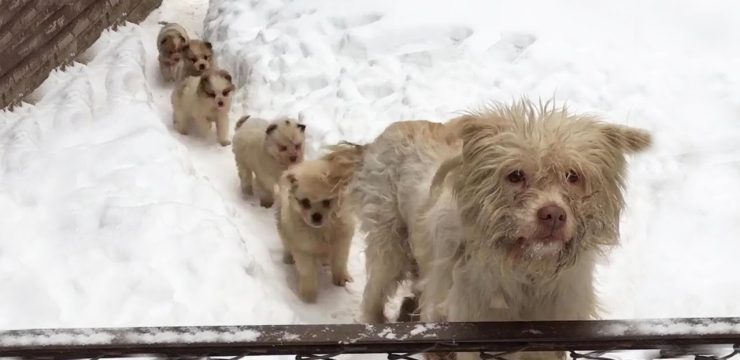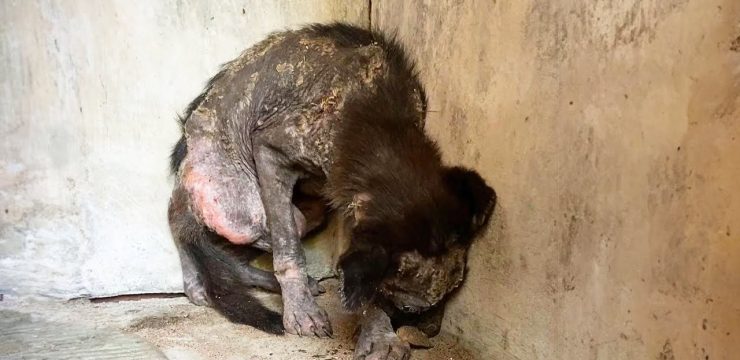In a quiet, forgotten corner of the city, where the sounds of life seemed muted and the air felt heavy with neglect, a stray dog wandered slowly through the empty streets. His movements were hesitant, almost labored, each step a small battle against the weight he carried—not just in his frail body, but in his weary spirit.
His fur, once perhaps soft and full, was now unkempt, matted from years of exposure to the elements. His ribs pressed against his skin, telling a silent story of hunger that had followed him for far too long. His eyes, deep and dark, seemed to hold an unspoken plea for help, though no words or bark emerged. They were eyes that had seen too much of the world’s indifference and too little of its kindness. A large, heavy tumor jutted from his side, a cruel and visible mark of his suffering. It distorted his small frame, making even the act of standing feel like an impossible task.
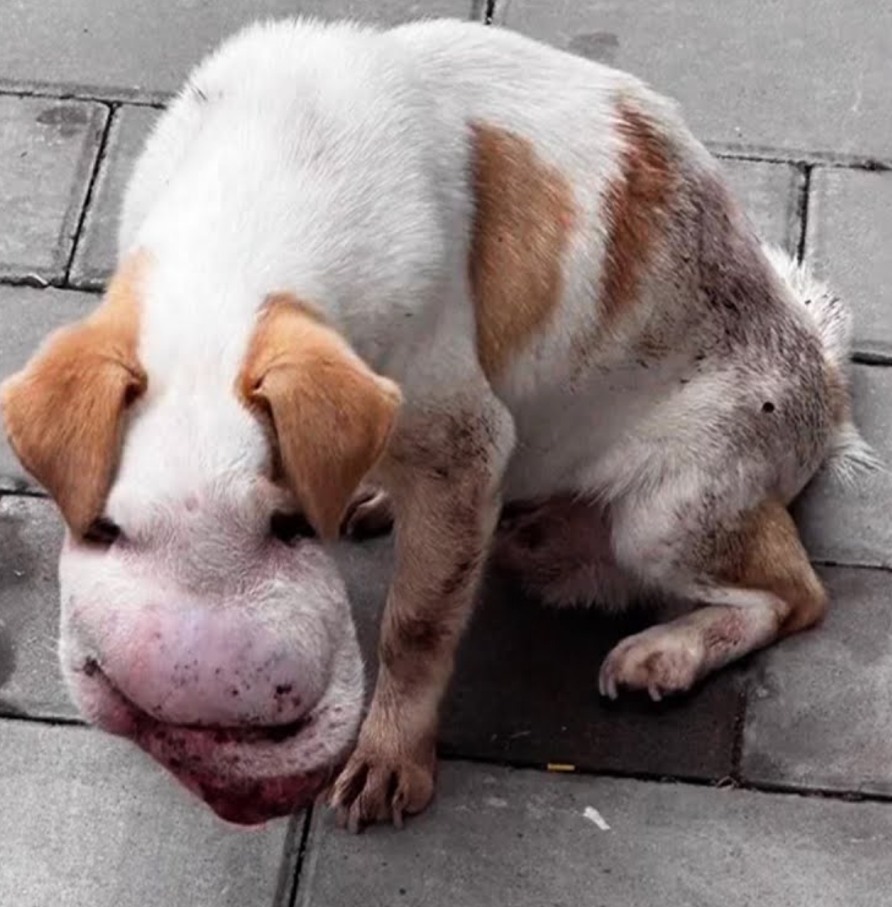
Each step seemed to draw from the last bit of strength he had left, and though the will to survive was still there, his body was betraying him. He did not bark—not out of choice, but because the years of hardship and perhaps illness had taken that ability from him. Whether it was the silence of disease or the silence of being ignored for too long, his voice had faded into nothingness, and all that remained was his quiet, desperate gaze. Day after day, he moved through the streets like a shadow, blending into the background of a city that no longer noticed him.
He searched for food in trash bins, pushing his nose into places where he hoped to find even the smallest scrap. Sometimes he found nothing at all. Other times, a morsel of stale bread or a discarded bone kept him going just a little longer. The hunger gnawed at him constantly, but the tumor made everything harder—lowering his head, bending his body, even taking a step all became acts of courage. In a place where people were always rushing past one another, where eyes rarely met, he was almost invisible. But fate has a way of changing in a single moment, and for this dog, that moment came one afternoon when someone finally stopped. A woman was walking down the same worn street, her pace quick at first, but something caught her eye—a thin, trembling dog standing against the wall of an abandoned building. She noticed the way his body leaned awkwardly, the strange shape pressing against his side.
She saw his ribs, his tired eyes, and the way he didn’t move away even when their eyes met. Something in her heart shifted. Without thinking about where she had been heading, she slowed down, knelt to the ground, and gently extended her hand. In it, she held a small piece of food. The dog hesitated at first, his instincts torn between mistrust and desperation. But the hunger was stronger, and he inched forward cautiously. She spoke to him softly, her voice carrying warmth he hadn’t known in years. Bit by bit, she fed him, and though he did not wag his tail, something in his posture began to change. It was the first time in a long while that someone had truly seen him—not as a nuisance or an invisible shadow, but as a living being in need of help. Over the next several minutes, her patience began to break through his fear. She didn’t rush him.
She simply stayed there, letting him take small steps toward her, letting him see that her presence brought no harm. When he finally allowed her to place a hand on his head, she felt the coarse, dirty fur beneath her fingers and the tremble of his frail body. With gentle determination, she coaxed him to follow her. It was a slow walk, but eventually she led him to an animal rescue center nearby. The moment they arrived, the staff at the shelter moved quickly, recognizing the urgency of his condition. They assessed him, noting his severe malnourishment, the tumor, and his inability to bark. He was sick, weak, and had a long recovery ahead, but now he was in a place where care replaced neglect. The days that followed were not easy. Treatments were started, meals were given regularly, and a safe, warm bed replaced the cold concrete he had known for so long.
His body, which had been on the brink of collapse, began to respond to the food, medicine, and rest. Slowly, strength returned to his limbs, and the tightness in his eyes eased. The tumor still posed a challenge, but now there was a plan, a team working to help him fight. Though he never found his bark again, he didn’t need it to express himself. His quiet resilience, the way he began to look directly at people without fear, spoke volumes. He had gone from being a ghost in the streets to a living soul surrounded by compassion.
The woman who had found him visited often, bringing treats and sitting with him in the corner of the shelter, speaking softly as if her voice alone could help him heal. And perhaps it did, because with every visit, he seemed a little more present, a little more willing to let the world in again. His story was not about a miraculous overnight transformation. It was about slow, steady change. It was about the way a single act of kindness could break through years of isolation. It was about how even the smallest gesture—offering a piece of food, stopping for a moment to see someone—could alter the course of a life. In a world that often feels too busy to notice, this dog’s life was saved because one person chose to stop, to care, to give. His silence remained, but it was no longer the silence of despair—it was the quiet dignity of a survivor who had been given another chance. And though his future was still uncertain, one truth was clear: he was no longer alone, and that made all the difference.
